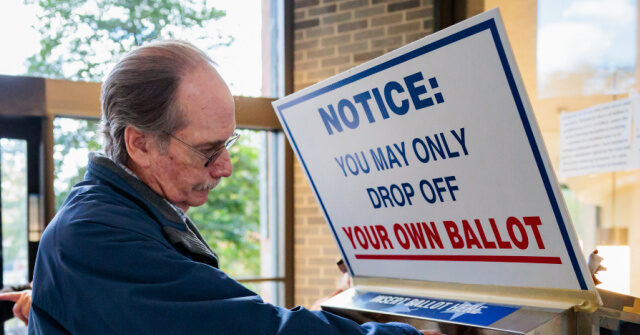In the competitive political landscape of Pennsylvania, the Republican Party is reportedly witnessing a significant turnaround in mail-in ballot returns, according to Cliff Maloney of Pennsylvania Chase. During an interview with Breitbart News, Maloney shared data indicating an 11-point swing in favor of Republicans compared to the 2020 election. He emphasized that the Pennsylvania Chase initiative aims to mobilize low-propensity Republican voters to not only request mail-in ballots but also ensure they are returned in time for the upcoming election. With approximately 90,000 more mail-in ballot returns from Republicans compared to the previous presidential election cycle, the forecast highlights a potent shift in voter engagement.
Maloney provided comparative statistics that further elucidate this trend. As it stands, Democrats have reported 514,000 mail-in ballot returns, while Republicans have seen 215,000. Notably, in the same timeframe leading up to the election, Republicans have increased their ballot returns by 90,000, whereas Democrats have experienced a decline of roughly 40,000. Maloney emphasized the importance of this data, highlighting that these figures reflect actual mail-in votes returned by party-affiliated voters rather than mere requests. This analysis suggests a broader mobilization trend among Republicans that may significantly impact the electoral outcomes in the state.
The stakes are particularly high in Pennsylvania, a critical battleground that President Joe Biden narrowly won by 80,000 votes in the last presidential election. Maloney underscored the importance of the current Republican momentum, suggesting that if registered Republicans can turn out their votes effectively, they stand a chance to not only close the gap but also potentially flip the state. This sentiment was reinforced by Maloney’s strategic recognition that if Republicans could address mail-in ballot return issues effectively, it could be pivotal for their success in Pennsylvania and beyond, as victory in the state could influence the overall race for the White House.
To bolster their campaign efforts, the Pennsylvania Chase has ramped up its ground game by hiring a dedicated staff of 120 full-time employees tasked with extensive outreach. These team members are actively engaging with Republican voters through door-to-door canvassing, an approach designed to encourage ballot requests and subsequent returns. Maloney explained that the initiative has set ambitious goals to knock on 500,000 doors across Pennsylvania, targeting those who may be reluctant or unable to vote otherwise. The commitment of the team, who work six days a week, reflects a tactical shift to prioritize voter engagement and ensure that registered Republicans are informed and mobilized ahead of the election.
One of the primary challenges that the Pennsylvania Chase seeks to address is the significant number of Republicans who requested mail-in ballots in 2020 but failed to return them—141,000 in total. Maloney believes that by rectifying this issue through direct voter engagement, the Republican Party can not only recover lost ground but could potentially claim victory in the state. This sentiment points to a broader strategy of grassroots mobilization that seeks to capitalize on favorable current trends in voter turnout and engagement among Republican constituents.
As the election approaches, the urgency for the Pennsylvania Chase team grows, with Maloney advising against complacency. The uncertainty of voter turnout and the historical context of previous elections underscore the need for a concerted and relentless effort in mobilizing Republican voters. With just a few weeks remaining before the election, the focus remains on ensuring that every potential vote is both cast and counted, reinforcing the critical nature of strategic voter outreach campaigns as pivotal components of the overall election strategy in Pennsylvania. In conclusion, the current data reveals a promising landscape for Republicans, driven by proactive engagement initiatives, but highlights that sustained efforts will be essential to translating enthusiasm into electoral success.

